|
|
|
Sort Order |
|
|
|
Items / Page
|
|
|
|
|
|
|
| Srl | Item |
| 1 |
ID:
133536
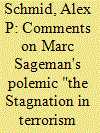

|
|
|
|
|
| Publication |
2014.
|
| Summary/Abstract |
Marc Sageman's lamenting about the "Stagnation in Terrorism Research" stands in stark contradiction to my conclusion in the Routledge Handbook of Terrorism Research (2011) that "Terrorism Studies-despite many shortcomings-has matured" and that "Terrorism Studies has never been in better shape than now." 1 While I agree with much else of what Marc Sageman says, there are a few points I disagree with. To begin with the notion of "stagnation": Terrorism Studies began, with few exceptions (Crozier, 1960; Thornton, 1964; Walter, 1964, 1969; Gaucher, 1965), 2 in the 1970s. Yet there had never been a period of real bloom in the 20th century-something which logically should precede the alleged stagnation after 9/11. As Andrew Silke noted in 2006:
|
|
|
|
|
|
|
|
|
|
|
|
|
|
|
|
| 2 |
ID:
132723
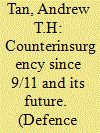

|
|
|
|
|
| Publication |
2014.
|
| Summary/Abstract |
Recent US experience in Iraq and Afghanistan has proven that COIN, however revised and updated to fit the globalised era in which we live, is a problematic and ineffective solution to the irregular warfare waged by insurgents. The United States and the West in general will have to accept the chastening lessons of Iraq and Afghanistan lest they repeat it: that they are not good at waging COIN and must try to avoid getting involved in such costly campaigns again. If intervention abroad has to be undertaken, it will have to fulfill a set of demanding conditions. Nonetheless, while COIN in its contemporary guise has failed to deliver long-term, tangible results, thinking about how to counter asymmetric challenges, including the waging of irregular warfare, cannot be ignored, given the likelihood that external interventions will continue to be required in the future. Moreover, while COIN as the basis of a grand strategy is unrealistic, some of its basic principles are useful in orientating future approaches to insurgencies and terrorism towards comprehensive and collaborative approaches, as opposed to merely hard security operations unilaterally undertaken by States, which fail to address the underlying fundamental causes of political violence and which undermine long-term legitimacy
|
|
|
|
|
|
|
|
|
|
|
|
|
|
|
|
| 3 |
ID:
132231
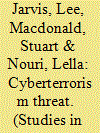

|
|
|
|
|
| Publication |
2014.
|
| Summary/Abstract |
This article reports on a recent research project exploring academic perspectives on the threat posed by cyberterrorism. The project employed a survey method, which returned 118 responses from researchers working across 24 different countries. The article begins with a brief review of existing literature on this topic, distinguishing between those concerned by an imminent threat of cyberterrorism, and other, more skeptical, views. Following a discussion on method, the article's analysis section then details findings from three research questions: (1) Does cyberterrorism constitute a significant threat? If so, against whom or what?; (2) Has a cyberterrorism attack ever taken place?; and (3) What are the most effective countermeasures against cyberterrorism? Are there significant differences to more traditional forms of anti- or counterterrorism? The article concludes by reflecting on areas of continuity and discontinuity between academic debate on cyberterrorism and on terrorism more broadly.
|
|
|
|
|
|
|
|
|
|
|
|
|
|
|
|
| 4 |
ID:
133094
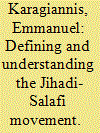

|
|
|
|
|
| Publication |
2014.
|
| Summary/Abstract |
Jihadi-Salafi groups have been on the march in the post-9/11 years on a violent campaign to achieve their ends. From North America to South-East Asia and from Europe to Sub-Saharan Africa, Jihadi-Salafis have attacked Western and local targets with often devastating results. Despite growing attention to the Jihadi-Salafi movement, which includes both globalized and localized components, there are still questions that remain largely unanswered. Three new books can shed light on this modern phenomenon that has preoccupied Western security policies for the past decade. Jihadi-Salafism is a large and diverse movement with a global reach that has embarked on an armed struggle to defend the imagined ummah.
|
|
|
|
|
|
|
|
|
|
|
|
|
|
|
|
| 5 |
ID:
133631
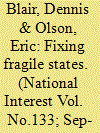

|
|
|
|
|
| Publication |
2014.
|
| Summary/Abstract |
America's cumbersome approach to interagency operations in the field urgently needs reform, centered around more powerful ambassadors and coordinated in-country policy design.
SINCE THE 9/11 attacks, the United States has waged major postwar reconstruction campaigns in Iraq and Afghanistan and similar but smaller programs in other countries that harbor Al Qaeda affiliates. Continued complex political, economic and military operations will be needed for many years to deal with the continuing threat from Al Qaeda and its associated organizations, much of it stemming from fragile states with weak institutions, high rates of poverty and deep ethnic, religious or tribal divisions. Despite thirteen years of experience-and innumerable opportunities to learn lessons from both successes and mistakes-there have been few significant changes in our cumbersome, inefficient and ineffective approach to interagency operations in the field.
|
|
|
|
|
|
|
|
|
|
|
|
|
|
|
|
| 6 |
ID:
133535


|
|
|
|
|
| Publication |
2014.
|
| Summary/Abstract |
Have you heard the story about the Englishman lost in an Irish mist trying to find the route to Limerick? He reaches a country crossroads, and asks an old man for directions; after much thought the old man's answer is, "If I were you I wouldn't start from here." From Sageman's account, you might in many ways infer that's the story of much contemporary terrorism research, and is, it seems to me, the unstated fundamental assumption behind his paper-if we had the freedom to start from scratch, if we were designing an area of study to investigate how violence is used to do things to influence political decision making, we'd probably want to conduct ourselves in a different way than we have. But we are where we are. Whether we like it or not, in studying terrorism and the terrorist, we engage with a world in which governments, officials, and politicians largely define the agenda (and keep changing it), set the rules for risk tolerance, and to a large extent control the money and through the choices they make direct research agendas.
|
|
|
|
|
|
|
|
|
|
|
|
|
|
|
|
| 7 |
ID:
133048


|
|
|
|
|
| Publication |
2014.
|
| Summary/Abstract |
Post 9/1 t, homeland security got tast tracked in the US and it is generally believed that the mainland has not suffered any terrorist incident since then aside from the Boston bombings at 2013 and periodic 'lone wolt' attacks. Most countries have come to realise that homeland security has a much wider canvas than protection lrom acts of violence. Within India, the tabric at homeland security apparently comprises a host of dots that are yet to be fully connected; integration of the security sector, intelligence, surveillance, national net-centricity et al. Homeland security involves pro-active policies and implementation in terms at analysis, reorganisation, diplomacy, intelligence gathering, building and synergising the security sector, or whatever it
takes to proactively detend the homeland. It goes for beyond civil detence.
|
|
|
|
|
|
|
|
|
|
|
|
|
|
|
|
| 8 |
ID:
133537


|
|
|
|
|
| Publication |
2014.
|
| Summary/Abstract |
Anyone who cares about both the national security threat arising from transnational al Qaeda-inspired terrorism and the need to develop a measured, effective response to this threat owes a great deal of gratitude to Marc Sageman. He was an early teller of inconvenient truths. As he notes in his essay, the tumultuous years following 9/11 were marked by the rise and mass dissemination of wild, ahistorical, and anecdote-based theories about the causes and possible solutions to violence motivated by the virulent ideology propagated by Sayyid Qutb in the 1950s and tragically brought to our shores by Osama bin Laden. Sageman insisted, however, that theory must be supported by evidence. He presented the facts as he saw them without regard to those he was undercutting on each side of the political spectrum. Over a decade after 9/11, his work has withstood the test of time and had a significant positive impact on our understanding of why al Qaeda attacked us and our policies for confronting this threat.
|
|
|
|
|
|
|
|
|
|
|
|
|
|
|
|
| 9 |
ID:
133539


|
|
|
|
|
| Publication |
2014.
|
| Summary/Abstract |
Dr. Sageman makes a good point that despite the influx of government funding in the last decade, terrorism scholars have not been able to answer what he calls a "simple question"-what leads a person to turn to political violence? But Dr. Sageman's conclusion that scholars' inability to answer this question is evidence of stagnation in the field is incorrect. First, most scholars who study terrorism are addressing risk factors for terrorism at the level of societies, not individuals, so it is hardly surprising that there is no "consensus answer" to Dr. Sageman's question. Second, the question Dr. Sageman poses about individual level decision-making is not at all simple to assess. It is difficult to make gross generalizations about what leads individuals to do what they do in any area of life; difficulty in answering this question is not unique to terrorism experts. Consider analogous questions about individual decision-making with regard to other life choices. Despite significantly more than a decade of study, neither scientists nor humanists have been able to explain, ex ante, what leads a person to fall in love, to murder another, or to choose a particular career path (as a terrorist, or otherwise). A detailed study of an individual's life history might enable scholars to propose ex post hypotheses as to why that individual chose a career as a terrorism expert rather than as a terrorist, but even then, experts from varying disciplines (including psychiatry) would focus on different parts of the problem, seen through different lenses. It is not clear why Dr. Sageman holds terrorism scholarship to a standard that no other group of scholars aiming to understand and predict human behavior has yet been able to achieve.
|
|
|
|
|
|
|
|
|
|
|
|
|
|
|
|
| 10 |
ID:
133538
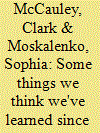

|
|
|
|
|
| Publication |
2014.
|
| Summary/Abstract |
It is a pleasure to have this opportunity to respond to a distinguished colleague's concerns about the progress of terrorism research since the 9/11 attacks. Marc Sageman sees little progress and identifies numerous impediments to research, notably including lack of good data and over-reliance on formal modeling
|
|
|
|
|
|
|
|
|
|
|
|
|
|
|
|
| 11 |
ID:
133534
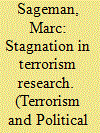

|
|
|
|
|
| Publication |
2014.
|
| Summary/Abstract |
Despite over a decade of government funding and thousands of newcomers to the field of terrorist research, we are no closer to answering the simple question of "What leads a person to turn to political violence?" The state of stagnation with respect to this issue is partly due to the government strategy of funding research without sharing the necessary primary source information with academia, which has created an unbridgeable gap between academia and the intelligence community. This has led to an explosion of speculations with little empirical grounding in academia, which has the methodological skills but lacks data for a major breakthrough. Most of the advances in the field have come from historical archival research and analysis of a few field interviews. Nor has the intelligence community been able to achieve any breakthrough because of the structure and dynamic of this community and its lack of methodological rigor. This prevents creative analysis of terrorism protected from political concerns. The solution to this stagnation is to make non-sensitive data available to academia and to structure more effective discourse between the academic and intelligence communities in order to benefit from the complementary strengths in these two communities.
|
|
|
|
|
|
|
|
|
|
|
|
|
|
|
|
| 12 |
ID:
133553
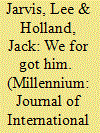

|
|
|
|
|
| Publication |
2014.
|
| Summary/Abstract |
This article explores how the death of Osama bin Laden was narrated by the Obama administration between the night of his killing and the 2012 State of the Union address. Three aspects of this unfolding story, in particular, are explored: i) descriptions of the operation itself; ii) constructions of bin Laden's life and character; iii) accounts of the significance and likely consequences of his killing. The article argues that the narration of these events was characterised, first, by considerable discursive continuity with the war on terrorism discourse of George W. Bush, and, second, by a gradual removal or 'forgetting' of bin Laden and the circumstances of his death. Each of these dynamics, we argue, contributed to the legitimisation of his killing, demonstrating the importance of narrative remembrance and forgetting alike for the conduct and justification of liberal violence.
|
|
|
|
|
|
|
|
|
|
|
|
|
|
|
|
|
|
|
|
|